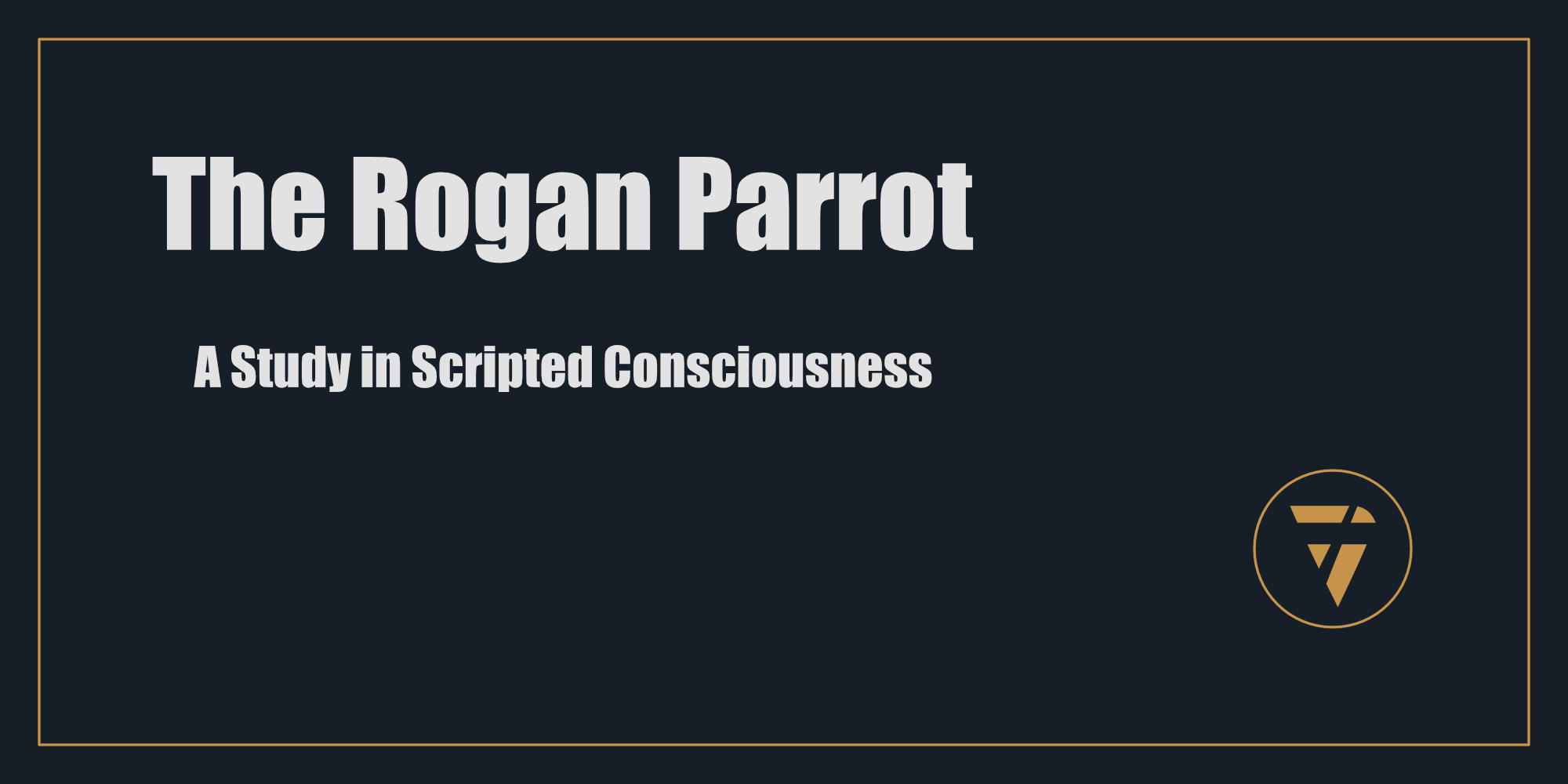The Rogan Parrot

A Study in Scripted Consciousness
It started as a casual conversation. Politics, Trump, the state of the world—standard topics for an impromptu exchange with a stranger. But within minutes, something became disturbingly clear: I had heard these words before. Not just the ideas, not just the perspectives, but the exact phrasing, the cadence, the inflection.
This wasn’t a conversation. This was a broadcast.
The man before me—let’s call him The Rogan Parrot—spoke in fully formed, neatly packaged segments. Each sentence, each argument, each rhetorical pivot had been aired before, replayed in podcasts, repeated in online forums, and recited in the digital echo chambers that follow Rogan’s orbit. There was no interpretation, no personal insight, no deviation from the script.
So I did something unusual. I started tracking. Paying attention.
For two and a half hours, I engaged in the illusion of dialogue while capturing the phenomenon unfolding in front of me. Not a single original thought surfaced. Not one. Every statement had an identifiable source—a past Joe Rogan episode, a viral clip, a Twitter debate regurgitated verbatim. It was like watching a musician play an instrument, but realizing they were just hitting “play” on a recording of someone else’s performance.
The Anatomy of the Rogan Parrot
The Rogan Parrot is not unique to Rogan’s audience, though his massive platform makes for a particularly potent case study. The phenomenon exists wherever a figure amasses cultural authority, and their followers begin to mistake repetition for independent thought. But Rogan’s appeal creates a specific breed of parrot—one that cloaks its mimicry in the illusion of free thinking.
Rogan’s style is conversational, seemingly open-ended, with the tone of a skeptic pushing back on mainstream narratives. But his most devoted listeners, rather than adopting the skepticism, adopt the narratives. Instead of critically examining information, they repeat his conclusions wholesale, often mistaking contrarianism for critical thinking.
The result? A human RSS feed of pre-approved takes on diet, masculinity, politics, censorship, and the ever-present spectre of they—the unnamed forces controlling the world, misleading the public, suppressing the truth, and doing them wrong.
In my conversation with the Parrot, this pattern emerged:
- The Podcast Premise
- I bring up a topic. The response? A perfectly recalled position from an episode, complete with Rogan’s trademark phrasing. No variation, no personal spin—just playback.
- Example: I mention social media algorithms. He responds, “It’s all dopamine hijacking. It’s a slot machine for your brain.”
- The Contrarian Reflex
- If an issue is widely accepted in mainstream discourse, the Parrot instinctively counters with the alternative view, whether or not it’s grounded in personal knowledge.
- Example: I mention climate change. He responds, “Yeah, but have you looked at sun cycles? They don’t want you to know about that.
- The Jocko Endorsement
- If a topic touches on self-discipline, masculinity, or personal struggle, the conversation shifts to Jocko Willink, David Goggins, or Jordan Peterson.
- Example: I mention work-life balance. “Dude, discipline equals freedom. You gotta wake up at 4 AM and just do the work.”
- The Media Distrust Blanket Statement
- Any argument countering the Parrot is dismissed as mainstream propaganda, fake news, or establishment manipulation.
- Example: I cite a study on vaccine efficacy. “Yeah, but you trust the media? You don’t think they have an agenda?”
- The Infinite Loop of Unquestionable Sources
- When challenged, the Parrot cites Rogan-approved thinkers: Bret Weinstein, Peter Attia, Graham Hancock. If you question their credibility, you’re met with disbelief: “Dude, they actually know what they’re talking about.”
6. The Casual Racism Clause
One of the most striking aspects of the Rogan Parrot is the ease with which racist language and ideas slip into conversation—not as overt, burning-cross rhetoric, but as casual, almost reflexive asides. It’s not the firebrand racism of the past; it’s the just asking questions racism of the present.
- The “It’s Just a Joke” Defense
- If you call it out, it’s dismissed as comedy. “It’s just a joke, people are so sensitive these days.” But the joke always seems to punch down.
- The IQ Gambit
- If the topic drifts into intelligence, expect a reference to “studies” about racial IQ differences. It’s rarely cited with specifics, but always framed as something they don’t want you to talk about.
- The Immigration Crisis Narrative
- Any discussion of global migration trends is framed as a cultural war. “Western civilization is under attack.” No mention of the actual economic or geopolitical factors driving migration—just a blanket fear of them.
- The Selective Historical Revisionism
- Slavery, colonialism, indigenous genocide—these are brushed off with, “Yeah, but that was a long time ago. And every culture did it.” But the grievances of the other side? Those are never forgotten.
What makes this particularly insidious is that it’s rarely shouted. It’s not a klan rally—it’s a steady normalization, an erasure of historical context, a nudge toward believing maybe the racists had a point on some things. It’s the gateway drug to ideological extremism, hidden beneath the sheen of just telling it like it is.
The Parrot doesn’t need to be a full-fledged bigot to push racist ideas. They just need to uncritically repeat the language of those who are.
Scripted Free Thinking
The most insidious part of this phenomenon is that it masquerades as independent thought. The Rogan Parrot is not mindlessly repeating mainstream media talking points; they believe they’ve broken free from the herd. In their eyes, they are enlightened, resistant to propaganda, intellectually superior to the “sheep” who blindly accept CNN or The New York Times.
And yet, they exhibit the exact same behaviour they critique—blind repetition, uncritical acceptance, parroting the words of a media personality without internal scrutiny.
This is the paradox of the modern pseudo-intellectual: convinced they are thinking for themselves while outsourcing every thought to a cultural proxy.
Breaking the Cycle
The question is—can the Parrot break free? Can someone who has spent years absorbing pre-packaged takes, convinced of their own intellectual sovereignty, begin to truly think independently?
Maybe. But it requires discomfort. It requires asking:
- What do I believe that I didn’t hear from a podcast?
- Can I articulate my position without referencing someone else?
- If I’m rejecting the mainstream, am I critically examining the alternative, or just switching allegiances?
And, perhaps most importantly:
- When was the last time I changed my mind?
Because real independent thinkers do that. They evolve, adapt, reconsider. The Parrot does not. The Parrot only repeats.
The Cost of Echoes
At the end of the conversation, I realized something: I had learned nothing new. Not because the ideas were inherently bad or wrong—many were compelling, some even insightful—but because they were all secondhand. Nothing was born in real time. Nothing was challenged or explored.
And that, ultimately, is the tragedy of the Rogan Parrot. Not that they listen. Not that they admire a thinker. But that, somewhere along the way, they stopped thinking for themselves.
This is what I’m working on. Tell me what you think, I enjoy the conversation! Subscribe and follow the work in real time.
Thanks!
B

The Rogan Parrot mistakes repetition for intelligence, and contrarianism for wisdom. Thought without challenge isn't thought at all—it’s obedience.
PS -






